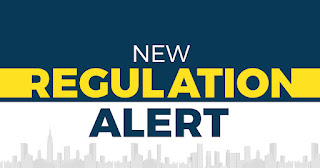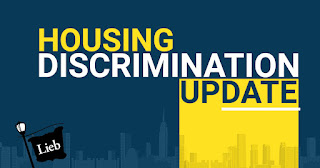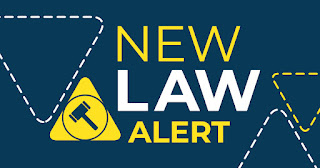On January 15, 2020,
Enhanced Fair Housing Provisions (page 12) were officially announced for New York State in the State Register.
Public Comment period goes to March 15, 2020 - make your comments by email:
david.mossberg@dos.ny.gov - or forever hold your peace.
The proposal includes additions to 19 NYCRR 175.28, 175.29 and 177.9.
Section 175.28. Notification of Fair Housing Laws requires real estate brokers to advise parties how to sue them for discrimination - BE WARNED - it states:
a) A real estate broker shall be responsible to ensure that each individual licensed pursuant to Article 12-A of the New York Real Property Law and associated with such broker provides to a prospective purchaser, tenant, seller, or landlord upon first substantive contact a disclosure notice furnished by the Department, containing substantive provisions of the New York State Human Rights Law. The disclosure
notice shall set forth how Human Rights Law complaints may be filed, and such other information as the Department deems pertinent.
b) The disclosure notice required pursuant to paragraph (a) of this section, may be provided to a prospective purchaser, tenant, seller, or landlord by any of the following means: email, text, electronic messaging system, facsimile, or hardcopy. An electronic communication containing a link to the disclosure notice required pursuant to paragraph (a) of this section shall be permissible, provided the communication also contains text to inform the prospective purchaser, tenant, seller, or landlord that the link contains information regarding the New York State Human Rights Law. Oral disclosure does not satisfy the requirements imposed by this section.
c) The disclosure notice required by paragraph (a) of this section shall apply to all real property whether or not it is used or occupied, or intended to be used or occupied, wholly or partly, as a home or residence of one or more persons regardless of the number of units, and shall include: condominiums; cooperative apartments; vacant lands, including unimproved real property upon which such dwellings are to be constructed; or commercial properties.
d) A real estate broker, licensed real estate salesperson, or licensed associate broker that provides the disclosure notice required pursuant to this section by hardcopy, shall obtain a signed acknowledgment from the prospective buyer, tenant, seller, or landlord. Such signed disclosure notice shall be retained for not less than three years. A real estate broker, licensed real estate salesperson, or licensed associate broker that provides the disclosure notice required pursuant to this section by email, text, electronic messaging system, or facsimile, shall maintain a duplicate copy of such disclosure and shall retain the same for not less than three years. If the prospective buyer, tenant, seller, or landlord declines to sign the disclosure notice, the real estate broker, licensed real estate salesperson or licensed associate broker shall set forth under oath or affirmation a written declaration of the facts regarding when such notice was provided and shall maintain a copy of the declaration for not less than three years.
e) A real estate broker shall be jointly liable for any violation of this section committed by any licensed individual associated with such broker.
---
Section 175.29. Posting of Fair Housing Laws requires new fair housing signs at offices, websites, & all open houses to advise parties how to sue them for discrimination - BE WARNED - it states:
a) A real estate broker shall display and maintain at every office and branch office operated by such broker a notice, furnished by the Department, indicating the substantive provisions of the New York State Human Rights Law relative to housing accommodations. The
notice shall set forth
how Human Rights Law complaints may be filed and such other information as the Department deems pertinent.
b) The notice required by paragraph (a) of this section shall be prominently displayed in the window of such office and any branch office maintained by such broker if such broker also provides listings or other postings in the window of such location and must be visible to persons on that portion of the sidewalk adjacent to such office or branch office. If any office or branch office is not accessible from the sidewalk or if postings are otherwise prohibited by any other applicable law, then the notice
required pursuant to paragraph (a) of this section shall be prominently posted in the same location the business license is posted pursuant to subdivision 3 of section 441-a of article 12 of the Real Property Law.
c) All websites created and maintained by real estate brokers, associate real estate brokers, real estate salespersons and any real estate team, as such term is defined by section 175.25 of this title, shall prominently and conspicuously display on the homepage of such website a link to the Department’s notice as required by paragraph (a) of this section, which shall be made available by the Department.
d) A real estate broker, licensed real estate salesperson, or licensed associate broker shall have displayed at all open houses of all real property the notice required by paragraph (a) of this section. In addition, a real estate broker, licensed real estate agent, or licensed associate broker shall
have available at all open houses and showings of all real property the notice required by paragraph (a) of section 175.28 of this part.
e) A real estate broker shall be jointly liable for any violation of this section committed by any licensed individual associated with such broker.
---
Section 177.9. Video Recording and Record Preservation requires schools to record their discrimination trainings - it states:
(a) Every entity approved to provide instruction pertaining to fair housing and/or discrimination in the sale or rental of real property or an interest in real property shall cause a recording to be created of each course in its entirety. Such recording shall contain both video and audio of the instruction.
(b) The recording required by paragraph (a) of this section shall be maintained by the approved entity for at least one year following the date such course was provided to an enrolled student. If the entity knows or suspects that the recording is or will be the subject of litigation, then the approved entity shall maintain such recording as required by law.
(c) The recording required by paragraph (a) of this section may be subject to audit by the Department pursuant to section 177.11 of this part.




















